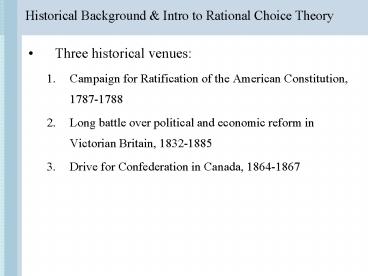Historical Background - PowerPoint PPT Presentation
1 / 13
Title:
Historical Background
Description:
Campaign for Ratification of the American Constitution, 1787-1788 ... Non-partisan Plumpers. Split-Ticket Voters. Political & Economic Reform in Victorian Britain ... – PowerPoint PPT presentation
Number of Views:50
Avg rating:3.0/5.0
Title: Historical Background
1
Historical Background Intro to Rational Choice
Theory
- Three historical venues
- Campaign for Ratification of the American
Constitution, 1787-1788 - Long battle over political and economic reform in
Victorian Britain, 1832-1885 - Drive for Confederation in Canada, 1864-1867
2
Political Economic Reform in Victorian Britain
- End of the old regime
- 1776 Loss of American Revolution
- Pulls power away from King to Parliament
Cabinet - 1789 French Revolution
- Creates elite resistance to radical reform (e.g.
universal suffrage) - 1803-1815 Napoleonic Wars
- Leaves Britain as worlds unchallenged
superpower, but at great financial cost
3
Political Economic Reform in Victorian Britain
- Beyond these political events, great economic and
social change - Industrial Revolution Urbanization
- Growing and increasingly radical working class
- Shift of wealth from country to city, i.e., elite
divisions between Tories (old, landed
aristocracy) and Liberals/Whigs (newer, urban
capitalists) - Peterloo Massacre 1819, Corn Law Repeal,
Chartism
4
Political Economic Reform in Victorian Britain
- Response is evolutionary change
- Reform Acts, 1832, 1868, 1885
- Repeal of the Corn Laws Free Trade in 1847
- Ascendancy of Cabinet Commons, 1910
- Home Rule in Ireland, 1921
5
Political Economic Reform in Victorian Britain
- The Reform Acts
- 1832 Reform Act (Representation of the People)
- modest expansion via property franchise (40s
freeholders 10 householders) - disenfranchisement of pocket boroughs
- 1867 Reform Act
- Significant expansion (1-2 million)
- Tenant (i.e., renters) franchise
- 1884 Reform Act
- Last step before universal manhood suffrage
- Near wholesale adoption of single-member districts
6
Political Economic Reform in Victorian Britain
Voting in Double-Member Districts
Non-partisan Plumpers
Split-Ticket Voters
7
Political Economic Reform in Victorian Britain
Trends in Split Voting, 1832-1910 Source Cox
1987
8
Political Economic Reform in Victorian Britain
Trends in Non-Partisan Plumping Voting,
1832-1910 Source Cox 1987
9
Political Economic Reform in Victorian Britain
The Decreasing Success Rate of Private Members
Bills, 1800-1900 Source Cox 1987
10
Political Economic Reform in Victorian Britain
The Nationalization of Politics and Changing
Nature of Elections, 1832-1895
11
Political Economic Reform in Victorian Britain
Figure 1. Electioneering Costs and Non-partisan
Plumping at Nineteenth Century British Elections
12
Political Economic Reform in Victorian Britain
Shifting to programmatic politics?
13
Political Economic Reform in Victorian Britain
- Institutional Changes
- Growth of parties (nationalized politics and
disciplined MPs) - Slow uptake of programmatic politics
- Political reform, Free Trade, and the Irish
Question - Cabinet dominance
- Lords as a veto player
- Refuge of landed interest, Empire and Church of
England

